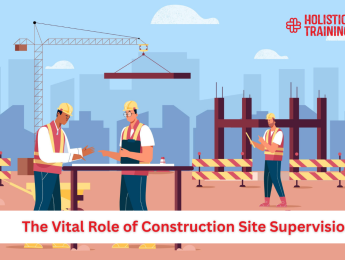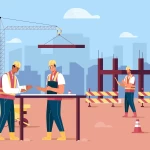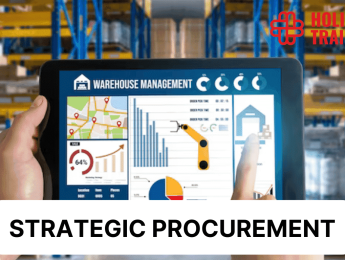- Table of Contents
- The Responsibilities of a Construction Supervisor
- 1- Strategic Planning and Coordination
- 2- Resource Management
- 3- Labour Oversight
- 4- Regulatory Compliance
- The Importance of Having a Construction Supervisor
- Risk Mitigation
- Quality Assurance
- Timeline Adherence
- Communication Nexus
- Navigating Potential Risks on a Construction Site
- Safety Hazards
- Structural Integrity
- Environmental Concerns
- Material Mismanagement
- Equipping Supervisors with Essential Safety Training
- a) Risk Perception and Response
- b) Emergency Preparedness
- c) Regulatory Compliance
- d) Promoting a Safety Culture
- Essential Skills and Characteristics of a Good Construction Site Supervisor
- 1- Leadership and Decision-Making
- 2- Communication Skills
- 3- Problem-Solving Aptitude
- 4- Technical Competence
- 5- Adaptability and Flexibility
- 6- Organisational and Time Management
- 7- Interpersonal Skills
- 8- Safety Consciousness
- In Summary
- Conclusion
In the dynamic world of construction, where towering skyscrapers reach for the heavens and intricate infrastructure projects shape the urban landscape, the presence of a vigilant overseer becomes paramount. The construction industry, while emblematic of innovation and progress, also encapsulates an array of potential hazards and challenges that necessitate a steady hand to guide operations. Enter the construction supervisor – a linchpin figure responsible for orchestrating the harmonious convergence of plans, people, and materials. In this article, we delve into the multifaceted realm of construction supervision, unveiling the profound importance of this role in ensuring safety, efficiency, and successful project completion.
The Responsibilities of a Construction Supervisor
At the heart of every construction site stands a construction supervisor, a figure who embodies a diverse set of responsibilities that extend beyond mere administrative duties. From the inception of a project to its culmination, the construction supervisor is the lighthouse guiding the fleet through treacherous waters. They are entrusted with coordinating every intricate detail, from project planning and resource allocation to managing labour forces and adhering to strict timelines.
1- Strategic Planning and Coordination
At the nucleus of every successful construction project stands the construction supervisor, functioning as a strategic maestro rather than merely an administrative overseer. Translating intricate blueprints and visionary plans into tangible reality requires a meticulous approach to strategic planning and coordination. The construction supervisor takes on this daunting task, considering not only the individual tasks at hand but orchestrating their sequence to ensure optimal efficiency.
This strategic orchestration involves a keen understanding of project timelines, resource availability, and potential bottlenecks. By intricately planning the sequencing of tasks, the supervisor ensures that materials, equipment, and labour are harmoniously synchronised. This foresightedness not only mitigates delays but fosters an environment where each element of the construction process seamlessly converges, propelling the project toward successful fruition.
2- Resource Management
A construction site resembles a symphony, with various elements contributing to the overall composition. The construction supervisor's responsibility extends to resource management, a task demanding judicious allocation and utilisation of resources. From concrete and steel to the human workforce, the supervisor must balance the orchestration of materials, equipment, and labour to prevent wastage and optimise cost-effectiveness.
By adeptly managing resources, the construction supervisor safeguards the financial health of the project. This entails not only understanding the immediate resource requirements but also forecasting future needs. Whether it's ensuring an adequate supply of construction materials or optimising labour deployment, the supervisor's resource management skills are instrumental in steering the project towards fiscal success.
3- Labour Oversight
Managing a diverse workforce is a nuanced task that goes beyond traditional supervisory roles. The construction supervisor not only assigns tasks but also fosters a harmonious work atmosphere. This involves understanding the strengths and capabilities of each team member, ensuring that skills are optimally utilised. Furthermore, the supervisor acts as a mediator, resolving conflicts and promoting effective communication among team members.
Creating a work environment that boosts morale and productivity is a hallmark of effective labour oversight. The construction supervisor, through interpersonal finesse, ensures that each worker understands their role within the broader context of the project. This not only contributes to the efficient completion of tasks but also cultivates a positive workplace culture, enhancing overall job satisfaction.
4- Regulatory Compliance
The construction industry operates within a complex web of regulations and codes that vary across regions. Navigating this intricate landscape requires a construction supervisor to be a seasoned professional well-versed in the legal nuances of construction. Fromzoning laws to safety regulations, the supervisor ensures that the project remains compliant, avoiding potential legal entanglements that could hinder progress.
Remaining up-to-date with the evolving regulatory environment is crucial for the construction supervisor. This commitment to compliance extends beyond a checklist mentality; it involves integrating regulatory considerations into the project's DNA. By doing so, the supervisor not only safeguards the legal integrity of the project but also contributes to a culture of responsible and ethical construction practices.
In summary, the multifaceted responsibilities of a construction supervisor extend far beyond overseeing day-to-day operations. They are the architects of efficiency, the guardians of resource utilisation, and the diplomats of a harmonious work environment. From the intricacies of strategic planning to the complexities of regulatory compliance, the construction supervisor's role is pivotal in ensuring the seamless orchestration of plans, people, and materials. Their ability to navigate this intricate web of responsibilities is not just a testament to their expertise but is also a cornerstone for the successful completion of construction projects.
Table 1: Key Performance Indicators (KPIs) of Construction Site Supervision
Key Performance Indicators | Description |
Safety Compliance | Ensure adherence to all safety regulations. |
Timely Project Completion | Meet project milestones within specified timelines. |
Effective Resource Management | Optimise use of labour, materials, and equipment. |
Quality Assurance | Enforce rigorous standards to ensure work quality. |
Communication Effectiveness | Facilitate clear and efficient communication channels. |
The Importance of Having a Construction Supervisor
In a realm where even the smallest oversight can lead to colossal consequences, the absence of a construction supervisor can resemble a ship without a captain. Here's why having a construction supervisor is an unequivocal necessity:
Risk Mitigation
Construction sites are inherently fraught with risks, ranging from the potential for structural collapses to electrical mishaps. A construction supervisor's vigilant presence acts as a compass, guiding the project away from potential hazards. They possess the experience and expertise to promptly identify risks and implement mitigation strategies, safeguarding the well-being of workers and the integrity of the project. In a landscape where even the smallest oversight can lead to colossal consequences, the construction supervisor is the first line of defence against potential disasters.
Quality Assurance
The quality of construction work is synonymous with its longevity and safety. Without the guiding hand of a construction supervisor, the intricate details that contribute to high-quality work may be overlooked. The supervisor enforces rigorous quality standards, ensuring that every element of the project meets or exceeds expectations. This commitment to quality is not only a testament to the supervisor's professionalism but is also a guarantee to stakeholders that the constructed infrastructure will stand the test of time.
Timeline Adherence
In the construction industry, the adage "time is money" holds immense significance. Delays can result in increased costs and disrupted project timelines. A construction supervisor meticulously monitors progress, intervening when necessary to ensure that the project remains on schedule. Their ability to foresee potential delays and take corrective action is instrumental in maintaining the project's timeline adherence. With an unwavering focus on deadlines, the construction supervisor ensures that each phase of the project progresses seamlessly, contributing to overall efficiency.
Communication Nexus
Clear and effective communication is the cornerstone of any successful endeavour, and the construction supervisor serves as the vital nexus between various stakeholders. Whether communicating with architects, contractors, or labourers, the supervisor ensures that information flows seamlessly. Their role as a communication facilitator extends to conflict resolution, where the supervisor's interpersonal skills come into play. By resolving conflicts and fostering open communication, the supervisor prevents potential roadblocks that could impede the project's progress. A construction site is a collaborative effort, and the supervisor's role as a communication linchpin ensures that every team member is on the same page.
In short, the importance of having a construction supervisor transcends the traditional boundaries of oversight. They are the guardians of safety, the custodians of quality, and the navigators of time. In an industry where precision and efficiency are paramount, the absence of a construction supervisor can lead to a cascade of challenges. Their role is not just about keeping the ship afloat; it's about guiding it through the intricacies of construction waters, ensuring that every element aligns with the overarching vision. As construction sites continue to be hubs of innovation and progress, recognising and valuing the indispensable role of the construction supervisor is key to the success and well-being of everyone involved.
Navigating Potential Risks on a Construction Site
A construction site, with its dynamic environment and complex machinery, is a breeding ground for potential risks that can escalate into catastrophic events. Vigilant supervision acts as the bulwark against these hazards:
Safety Hazards
Construction sites, by their very nature, are rife with safety hazards. From towering scaffolds to heavy machinery in constant motion, the potential for accidents looms large. Without proper guidance and supervision, these hazards magnify, significantly increasing the likelihood of injuries or even fatalities. A construction supervisor's role in identifying, addressing, and mitigating safety hazards is paramount. Their watchful eye and proactive measures create a safer work environment, instilling confidence in the workforce and reducing the inherent dangers associated with construction activities.
Structural Integrity
The stability of a building hinges on the precision of its construction. Without vigilant supervision, critical mistakes that compromise structural integrity might go unnoticed. A construction supervisor's oversight is essential for ensuring that every component of the construction process aligns with the project's structural requirements. By scrutinising each phase of construction, from foundation laying to the placement of structural elements, the supervisor acts as a guardian, preventing oversights that could jeopardise the safety and longevity of the constructed infrastructure.
Environmental Concerns
Construction activities, if not managed responsibly, can have adverse effects on the environment.Excavation, waste disposal, and material usage all contribute to the ecological footprint of a construction site. A construction supervisor ensures that the project adheres to environmental regulations, preventing pollution and ecological degradation. Their role extends beyond the immediate project goals to incorporate sustainable practices, aligning the construction site with broader environmental standards. By integrating eco-friendly measures, the construction supervisor becomes a steward of both project success and environmental responsibility.
Material Mismanagement
The handling and storage of construction materials demand meticulous oversight. Poor management in this aspect can result in waste, financial losses, and delays. A construction supervisor's watchful gaze ensures that materials are used efficiently and judiciously. By implementing proper storage procedures and optimising material usage, the supervisor contributes not only to cost-effectiveness but also to the overall financial health of the project. Material mismanagement can lead to unnecessary expenses, and the supervisor's role in preventing such inefficiencies is indispensable.
In summary, navigating potential risks on a construction site requires a supervisor with a comprehensive understanding of the multifaceted challenges inherent in the construction process. From safety hazards that threaten the well-being of the workforce to structural oversights that compromise the integrity of the project, the construction supervisor's vigilant watch is an assurance of project success and the safety of all involved.
As construction sites continue to evolve as centres of innovation and progress, the role of the construction supervisor in risk management becomes even more critical. Their ability to foresee, identify, and proactively address potential risks is not just a testament to their expertise but is a linchpin for the overall success and safety of the construction project. The construction supervisor emerges as the silent sentinel, standing guard against the myriad challenges that construction sites pose, ensuring that the path to project completion is not only efficient but also safe and environmentally responsible.
Equipping Supervisors with Essential Safety Training
Statistics show that construction beats industries by having the 2nd most workplace deaths. In a realm where safety is paramount, construction site supervisors need to be armed with comprehensive safety training. Here’s why:
a) Risk Perception and Response
Safety training for construction site supervisors serves as a crucible for honing their ability to perceive and respond to potential risks. This goes beyond recognising hazards; it involves developing a keen foresight to identify potential risks before they manifest. By instilling a proactive mindset, safety training empowers supervisors to take swift, effective action to mitigate risks. This level of risk perception is instrumental in minimising accidents and injuries on the construction site, contributing to a safer working environment for everyone involved.
b) Emergency Preparedness
Construction sites are inherently vulnerable to emergencies, ranging from fires and collapses to chemical spills. Safety training equips supervisors with the knowledge and skills needed to respond swiftly and effectively to such crises. This preparedness is not just about minimising damage to property but is crucial in potentially saving lives. Through simulated scenarios andhands-on training, supervisors become adept at orchestrating emergency responses, ensuring that the construction site remains a secure environment even in the face of unforeseen challenges.
c) Regulatory Compliance
The regulatory landscape governing construction safety is complex and ever-evolving. Safety training ensures that supervisors are well-versed in local safety regulations and codes. Beyond mere compliance, this knowledge serves as a shield, safeguarding the workforce and the project from potential legal repercussions. A supervisor equipped with an understanding of safety regulations becomes a proactive enforcer, ensuring that every aspect of the construction site aligns with the prescribed safety standards.
d) Promoting a Safety Culture
A construction site's safety culture is not just a set of rules; it is a collective mindset that starts at the top. Safety training instils in supervisors the importance of prioritising safety through their actions and decisions. When supervisors exemplify a commitment to safety, this ethos permeates throughout the workforce. It creates an environment where every worker is vigilant, responsible, and actively contributes to maintaining a safe workplace. Safety becomes ingrained in the construction site's culture, fostering a collaborative effort to minimise risks and ensure the well-being of all team members.
In short, the provision of essential safety training for construction site supervisors is not a formality; it is a strategic initiative with far-reaching implications. It transforms supervisors from mere overseers into vigilant stewards of well-being, capable of identifying, addressing, and preventing potential risks. As the silent sentinels of construction, supervisors armed with comprehensive safety training become key players in shaping a safety culture that permeates every aspect of the construction site.
In an industry where the margin for error is slim and the consequences of oversight are significant, safety training for supervisors is an investment in the longevity of projects, the welfare of the workforce, and the overall success of construction endeavours. As construction sites evolve as hubs of innovation and progress, the importance of safety training for supervisors cannot be overstated; it is a linchpin in the quest for safer, more efficient construction environments.
Essential Skills and Characteristics of a Good Construction Site Supervisor
In the complex and dynamic world of construction, a good site supervisor is not merely an overseer; they are a leader who navigates challenges, ensures efficiency, and safeguards the well-being of the team. The role demands a unique blend of skills and characteristics that go beyond technical know-how. Let’s delve into the essential attributes that define a proficient construction site supervisor:
1- Leadership and Decision-Making
At the core of a good construction site supervisor is strong leadership. The ability to make informed decisions under pressure, delegate tasks effectively, and inspire confidence in the team is paramount. A good supervisor leads by example, fostering a culture ofaccountability and collaboration. They navigate the intricacies of the construction site with a clear vision, ensuring that every team member understands their role in achieving project goals.
2- Communication Skills
Effective communication is the linchpin of successful construction projects. A good supervisor communicates clearly and concisely with diverse stakeholders, including architects, contractors, labourers, and regulatory authorities. They must convey complex technical information in a way that is easily understandable. Moreover, the ability to listen actively and address concerns ensures a harmonious work environment and helps in resolving conflicts swiftly.
3- Problem-Solving Aptitude
Construction sites are dynamic environments where challenges can arise unexpectedly. A good supervisor possesses a sharpproblem-solving aptitude, capable of addressing issues on the fly. Whether it's resolving logistical challenges, adapting to unforeseen circumstances, or finding innovative solutions to technical problems, a good supervisor approaches each challenge as an opportunity for improvement.
4- Technical Competence
While leadership and communication skills are paramount, technical competence forms the foundation of a good construction site supervisor. They should have a deep understanding of construction processes, engineering principles, and relevant technologies. This knowledge allows them to assess the feasibility of plans, identify potential risks, and provide valuable insights during project planning and execution.
5- Adaptability and Flexibility
Construction projects rarely unfold exactly as planned. A good supervisor embraces adaptability and flexibility, understanding that adjustments may be necessary. Whether it's coping with changes in project scope, unexpected weather conditions, or modifications in regulatory requirements, a flexible supervisor navigates these challenges with resilience, ensuring that the project stays on course.
6- Organisational and Time Management
Given the fast-paced nature of construction projects, effective organisational andtime management skills are crucial. A good supervisor must prioritise tasks, allocate resources judiciously, and ensure that the project adheres to timelines. This involves coordinating with various teams, managing schedules, and preventing bottlenecks that could impede progress.
7- Interpersonal Skills
Building and managing a diverse team requires strong interpersonal skills. A good supervisor understands the strengths and weaknesses of team members, motivates the workforce, and fosters a positive work culture. This involves recognising achievements, providing constructive feedback, and ensuring that every team member feels valued.
8- Safety Consciousness
Safety should be ingrained in the supervisor's mindset. A good construction site supervisor prioritises safety above all else. This involves enforcing safety protocols, conducting regular safety briefings, and actively participating in safety training initiatives. A safety-conscious supervisor instils a culture where everyone is vigilant and committed to maintaining a secure work environment.
In Summary
A good construction site supervisor is not just a manager; they are a leader who embodies a diverse set of skills and characteristics. From effective communication and problem-solving aptitude to technical competence and a commitment to safety, the supervisor's role is multifaceted. As construction sites continue to evolve as hubs of innovation and progress, recognising and cultivating these essential skills and characteristics becomes integral to shaping proficient leaders who can navigate the complexities of the construction landscape with finesse.
Conclusion
The world of construction, characterised by grandeur and complexity, is underpinned by the unsung heroes of supervision. Construction supervisors bear the weight of responsibility, overseeing projects from their inception to fruition. Their presence is the linchpin that holds together the intricate tapestry of plans, people, and materials. In an environment teeming with potential risks and challenges, the construction supervisor is the unwavering sentinel that safeguards progress and lives alike.
Through strategic planning, resource management, and regulatory compliance, the construction supervisor navigates the labyrinthine landscape of construction with finesse. Their role extends beyond administrative tasks, encompassing quality assurance, risk mitigation, and communication facilitation. Indeed, their absence leaves a void that can lead to costly mistakes, delays, and compromised safety.
As construction sites continue to be hubs of innovation and progress, it is imperative to recognise the indispensable role of supervision in ensuring not only the completion of projects but also the safety and well-being of everyone involved. By providing supervisors with comprehensive safety training, we empower them to be vigilant stewards of well-being, prepared to identify, address, and prevent potential risks.
In a world where each foundation laid and beam assembled contributes to the evolution of our urban landscapes, let us never underestimate the pivotal importance of the construction supervisor. They are the silent sentinels, the guardians of progress, and the custodians of safety, ensuring that our aspirations soar as high as the skyscrapers they oversee.
If you’re interested in becoming a proficient construction site supervisor, then you need to enrol in our comprehensive course, ‘Construction Site Management/Supervision,’ designed to equip you with the skills and knowledge needed to excel in this vital role. Join us in shaping safer, more efficient construction environments for the future.
























